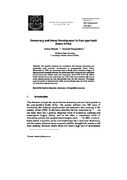| dc.contributor.author | Matunhu, Jephias | |
| dc.contributor.author | Nengwenkhulu, Ranwedzi | |
| dc.date.accessioned | 2015-10-26T21:19:04Z | |
| dc.date.available | 2015-10-26T21:19:04Z | |
| dc.date.issued | 2012 | |
| dc.identifier.uri | http://hdl.handle.net/20.500.12280/61 | |
| dc.description.abstract | The research addresses the contentious link between democracy and sustainable rural economic development in post-apartheid South Africa. Historically, in 1994, the democratic state in South Africa inherited a legacy of high economic inequality between the urban areas (first economy) and rural areas (second economy). Fifteen years into democracy: about 65% of the 48 million South Africans live in the rural areas; and 75% of the rural residents still survive under extreme poverty and are disconnected from the first economy. This paper argues that lack of entrepreneurial skills and knowledge keeps the rural residents out of the first national economy. | en_US |
| dc.language.iso | en | en_US |
| dc.publisher | Uganda Martyrs University | en_US |
| dc.relation.ispartofseries | Journal of Development Studies;2 (1) | |
| dc.subject | Rural development | en_US |
| dc.subject | Democracy | en_US |
| dc.subject | Post-apartheid economy | en_US |
| dc.title | Democracy and rural development in post-apartheid South Africa | en_US |
| dc.type | Article | en_US |


